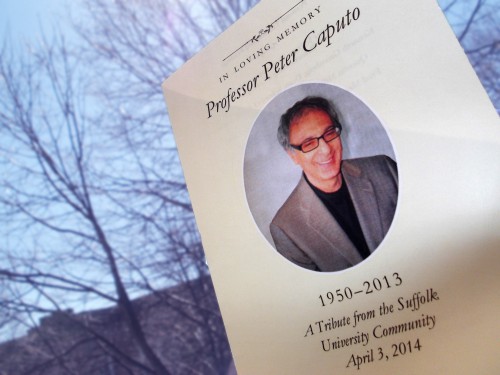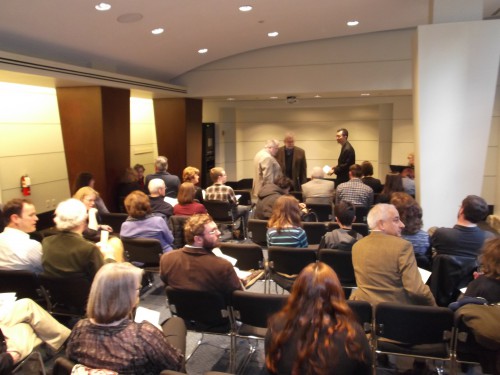
As seats filled in the amenities room on the first floor of the 73 Tremont building, a guitar player sat in the corner strumming The Beatles tune “In My Life,” which set the tone for an evening celebrating the life of a man who had accomplished so much in his 63 years.
Peter Caputo, an English professor at Suffolk for 30 years, was remembered as brilliant, humble, candid, respectful, funny and stubborn, during a memorial service last Thursday night for the Suffolk community.
Caputo died in December after a two-year battle with cancer and had been an important and beloved member of the university.
This was evident Thursday night as he was honored by those who miss him the most — his colleagues, former students, and family. The night was filled with kind words, poetry and anecdotes detailing the impact Caputo had on the lives of those around him.
One of Caputo’s great accomplishments was creating Suffolk’s writing center, now known as CLAS.
Caputo was a writer himself and was also extremely well-versed in Victorian literature, classical mythology and postmodern fiction, among others.
Professor Emeritus Fred Marchant recalled the last glimpse he had of his dear friend and colleague. It was the final day of classes of the fall semester and Caputo was crossing Beacon Street. As Marchant looked on from a distance, he recalled during the service, Caputo paused in the middle of the street, just for an instant, and then carried on. It was a small moment, but one that encapsulated Caputo’s character.
“He was an exceptionally thoughtful person who wasn’t interested in pre-packaged thought,” said Marchant, distinguished poet and recently retired English professor.
That contemplative moment on Beacon Street was what helped inspire Marchant to write the poem “One Beacon Street,” which he dedicated to Caputo and read Thursday night.
Paul Rowe, Caputo’s former student and teaching assistant, praised the late professor for his intense and abiding passion. Rowe described Caputo as electrifying both in and out of the classroom, always willing to talk and to help out a student.
“He needed us as much as we needed him,” said Rowe.
Rowe recalled a time last semester when Caputo, in the midst of sickness, took his students to Toscano in Harvard Square and bought them dinner.
His students and his teaching had always taken precedence in Caputo’s life. He was a modest and a private man. This is why he rarely talked about the severity of his disease to anyone. In fact, many were unaware he was sick at all.

“Peter was a connoisseur of life,” said Professor Da Zheng. “He loved food, culture and France.”
Food was a common motif of the night. Caputo talked a lot about food, especially Italian. As an Italian-American raised in Brooklyn, N.Y., Caputo was immensely proud of his heritage.
Being from Brooklyn, he also loved the Yankees.
When it was Professor Rich Miller’s time to speak of his late colleague and friend, he placed a Yankees cap atop the podium. As Miller noted, Caputo’s all-time favorite Yankees player was Mickey Mantle, No. 7
Miller recognized Caputo as the older brother he never had, saying he probably knew him like no one else did. The two had offices opposite one another in Fenton and they spent a lot of time discussing food, travel, wine and the Yankees. Miller jokingly admitted that he and Caputo also spent time gossiping about colleagues — something Caputo was good at, Miller said.
Eileen Feldman of the English department recited one of Caputo’s poems entitled “Rain.” In the context of his passing, the lines were even more beautiful and poignant, illustrating the measure of a man who was practiced in the literature of life.
Professor Peter Jeffreys called Caputo a gifted writer and mentor who was always ready to listen. He also appreciated Caputo’s “zingers” and ability to find humor in situations. Dean Kenneth Greenberg said Caputo’s bravery and humility during his disease was inspiring.
Others who remembered Caputo included Marilyn Jurich, Hilary Nanda and Tony Merzlak of the English department and former student Matthew Bancroft. Their stories and poetry readings helped piece together the life of this private, complicated man.
Emotions filled the room as Caputo’s sister, Theresa Maronna, described how her brother spent two years struggling to make meaning of his illness. But through it all, he retained his lively wit and ability to laugh, Maronna recalled. Even in the hospital he would crack jokes to the nurses, making them laugh uncontrollably.
Caputo was a bright light at Suffolk, so it is fitting that his legacy will live on in the form of the Peter Caputo Academic Achievement Scholarship. The scholarship was made possible by multiple donations. The first recipient, senior Jennie Bonanno, was in attendance Thursday night to accept her award.
As Rowe said, Caputo encouraged all of his students to follow their own arrows. It is clear that Caputo did the same in his own life, and the Suffolk community is forever thankful that they got to be a part of it.

















